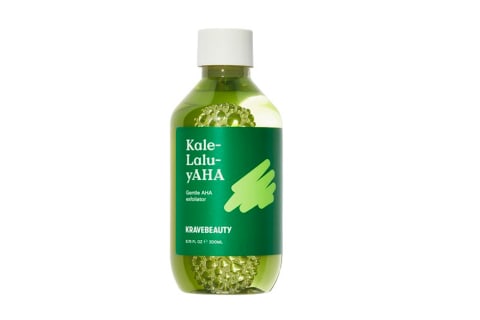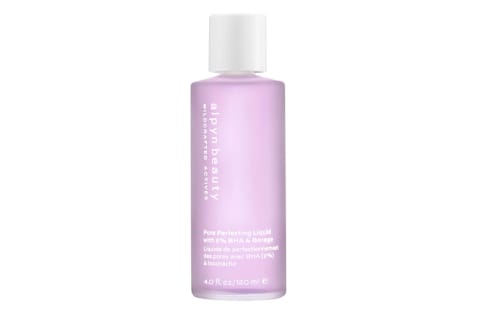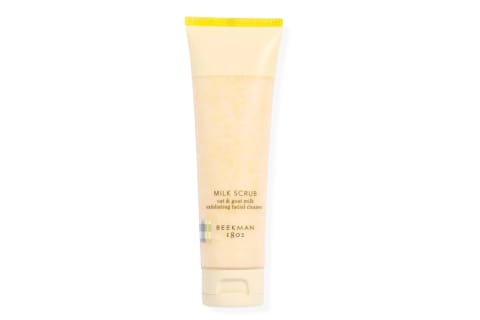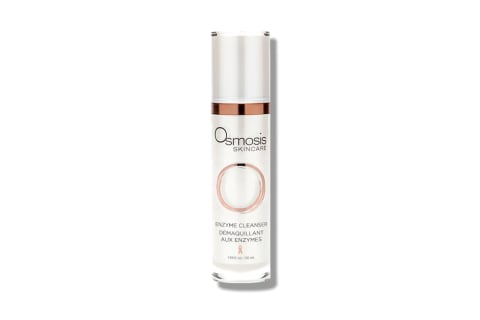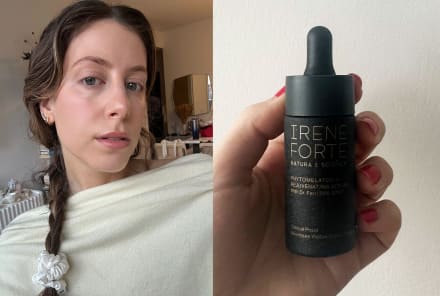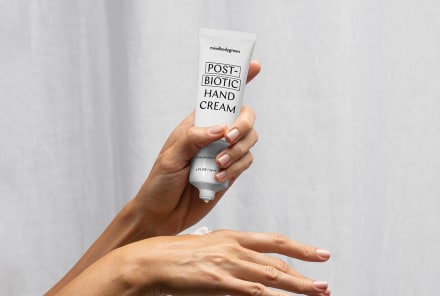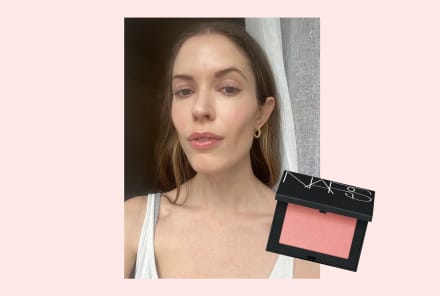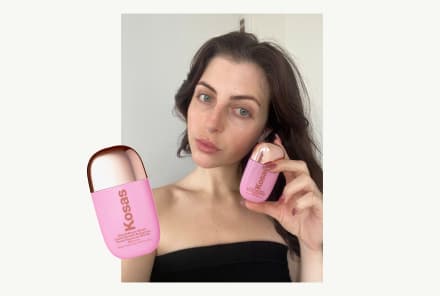Advertisement
How To Exfoliate Your Face: 9 Tips From Experts + Signs You Should Skip It

Hannah Frye is the Assistant Beauty Editor at mindbodygreen. She has a B.S. in journalism and a minor in women’s, gender, and queer studies from California Polytechnic State University, San Luis Obispo. Hannah has written across lifestyle sections including health, wellness, sustainability, personal development, and more.

Exfoliation has gotten a bad reputation over the years, thanks to some extra-harsh face scrubs that left plenty of people with red and irritated complexions. However, derms will be the first to tell you that this process is a must for the plump, smooth, and bright complexion many of us are working toward.
To ensure you reap all of the benefits of exfoliation without the damage, we asked derms to break down each method and the right cadence to make it more approachable.
What is exfoliation?
According to board-certified dermatologist Rachel Maiman, M.D., of Marmur Medical, exfoliation is the process of removing dead skin cells from the outer layer of the skin. When you do this, you're met with instant results in the form of smoother, brighter skin.
But isn't the skin supposed to take care of itself? Well, it kind of does. See your skin naturally exfoliates itself every single day—in fact, you shed between 30,000 and 40,000 dead skin cells every minute.
However, things like weather, lifestyle, skin care products, age, and dehydration can slow down or halt this process, which can result in dull, flaky, congested skin over time—hence, why you should add exfoliation to your routine.
What are the two types of exfoliation?
There are two types of exfoliation, including chemical and physical—here's the difference:
- Physical exfoliation: A physical exfoliant (aka manual exfoliant) typically uses some type of granules like salt, sugar, or crushed grains and seeds to help lift and scrub away dead skin cells. "Physical exfoliation uses something abrasive," says board-certified dermatologist Amy Ross, M.D. Often, these types of exfoliators can get a bad rep for being too harsh and causing the skin to become stripped and dry when used on the face, but there are plenty of safe and gentle options out there.
- Chemical exfoliation: Chemical exfoliants use chemicals to break apart and remove dead skin cells. "These are commonly alpha-hydroxy acids (AHAs)," Ross says, or beta-hydroxy acids (BHAs), but more on the difference in a bit. "The strength of the acid can be adjusted to create safe, mild, and effective exfoliation for all skin types," Ross adds.
How to exfoliate the face.
Now let's get into the real question—how does one exfoliate the skin well enough to see a glow but not too much? Here are a few derm-backed methods:
AHA
"Alpha-hydroxy acids are lipophilic, meaning they mingle well with water and remain superficial on the skin surface," board-certified dermatologist Brendan Camp, M.D., FAAD, tells mbg. These are great for anyone with sensitive skin looking for gentle exfoliation and some healthy skin aging effects, Camp notes.
A few examples of AHAs include glycolic acid, mandelic acid, and lactic acid. These ingredients can be found in cleansers, serums, masks, and even moisturizers. They vary in strength, with products designed for sensitive skin containing a less potent dose of AHAs than those formulated for normal or oily skin types.
BHAs
"Beta-hydroxy acids, or BHAs, are oil-soluble exfoliants, which can penetrate deeper into pores and tend to have antibacterial properties," board-certified dermatologist and founder of Cutocin Nicole Hayre, M.D., FAAD, explains. The most common beta-hydroxy acid is salicylic acid, which is widely used in acne products thanks to its ability to dive deep into the pore.
These ingredients tend to be a tad stronger than AHAs, which is why they're not normally recommended for those with sensitive skin unless you have sensitive skin and breakouts. Even then, you may want to opt for a gentle salicylic acid product (read: less than 2% SA) or use it in a wash-off cleanser or mask.
Physical scrubs
Next up, we have physical scrubs. If you want to take this route, be sure to look for a scrub that's blended with hydrating oils, butters, or waxes to smooth and protect the skin. In addition, resist pressing too hard on the skin when scrubbing—let the product work alone.
Physical exfoliation can also offer more immediate results: "Physical exfoliation offers instant gratification, as dead skin cells and dirt are swept away during the treatment—it's perfect if you need an immediate glow. Some patience is required with chemical exfoliation," board-certified dermatologist Jessie Cheung, M.D., said.
DIY scrubs
Speaking of scrubs, did you know that you can make your own? Different from scalp and body scrubs, this DIY face exfoliator calls upon gentle powders and finely ground ingredients (skip the salt and large crystal sugar).
There are plenty of different blends you can explore (a few of which can be found here), but this is one of our favorites: a cinnamon spice scrub for acne-prone skin.
- ¼ tsp. cinnamon powder
- ½ tsp. turmeric powder
- ½ tsp. rosehip seed powder
- ½ tsp. water
Enzymes
Now onto another gentle exfoliant, enzymes from fruit extracts. "Enzymatic exfoliants dissolve or break apart the bonds between dead skin cells. This impacts the exfoliation process by facilitating the removal of dull-appearing cells from the skin surface," Camp notes.
Because enzymes are less intense than their chemical and physical exfoliation cousins, you can use these exfoliants two to three times a week, Camp says. Like AHAs, you can find enzymes in cleansers, toners, serums, and masks.
Gommage washes
Gommage washes are the French's beloved way to exfoliate. (fun fact: gommage is the French word for scrub)
"Gommage is a French technique of gentle exfoliation, licensed esthetician at Shafer Clinic Edyta Jarosz said. "It uses a combination of ingredients that exfoliate your skin chemically through the combination of enzymes and scrubbing to slough away dead skin and other debris from the surface of the skin."
"Gommage washes are ideal options for those with more sensitive skin as they tend not to penetrate as deeply as AHAs or BHAs," Camp notes.
Face brushes
Facial cleansing brushes tend to be too harsh for daily use, but they are technically one method of exfoliation. You'll want to stick with silicone bristles if possible, as those hold on to fewer bacteria than other bristle brushes.
In addition, make sure you deep clean your cleansing brush often to avoid spreading bacteria on your skin and causing breakouts or infections.
Chemical peels
Now, moving on to some in-office methods. "Almost anyone can benefit from a chemical peel," Hayre says. "I tend to use them frequently on my patients for treatment of melasma or to help clear sun damage." She notes that those with very sensitive skin should opt out of classic chemical peels, as the potent acids can be irritating.
"Chemical peels can address a number of skin concerns. These include acne, uneven skin tone, blemishes, enlarged pores, melasma, dark spots from sun damage, and fine lines," Camp explains.
Warning
Microdermabrasion
"Microdermabrasion is a physical exfoliation which uses a textured wand combined with a gentle suction to help exfoliate and remove debris from pores," Hayre says. You can have this done in-office if your dermatologist or esthetician provides it.
It's much less invasive than chemical peels and will produce noticeable results without the extended downtime. "Microdermabrasion is a great option for those looking to improve their skin texture, as it makes skin feel smooth and makes the application of makeup easier," Camp adds.
How often should you exfoliate?
"The most important tip is that 'less is more.' You want to exfoliate just enough to increase cell turnover and reveal fresh new skin," said Ife Rodney, M.D., a board-certified dermatologist and founder of Eternal Dermatology. "But be sure to not scratch or damage your skin by overusing these devices or products."
More specifically, "Most people with normal or combination skin can get away with twice or even thrice-weekly exfoliation," she says. "Those with more mature, dry, or sensitive skin, may only want to exfoliate weekly." You may even try skin cycling if you're using retinol and exfoliants in your routine to space them out with intention.
This becomes even more nuanced when you remember that exfoliants come in the form of serums, masks, toners, and moisturizers—however, you should follow the same rule and choose one exfoliator per evening you decide to exfoliate (be it once, twice, or three times a week).
If you use gentle formulas, you may be able to exfoliate more frequently. On the flip side, stronger exfoliating products like the Cutocin Weekly Rendezvous Exfoliator pads (and many other exfoliating pads) should be used in moderation.
The second your skin becomes irritated (signs to follow), hold off on exfoliating and switch to a barrier-supporting routine instead.
Signs you shouldn't exfoliate.
Say you used your go-to exfoliant one too many times in a week or your skin barrier is compromised for other reasons (a sunburn, too much retinol, harsh weather, etc.). This means you should not use an exfoliant. Not sure how to tell your skin barrier is damaged? Here are a few signs:
When your skin is in this state, kick into recovery mode. You'll want to avoid exfoliating for a few days and sub in hydrating serums, rich face moisturizers, and botanical oils. Do your best to stay away from fragrance and retinol during this time as well—more on repairing your barrier here, if you're curious.
FAQ
How can I exfoliate my face at home?
For a DIY exfoliating face wash, stir together and apply the following: ¼ tsp. cinnamon powder, ½ tsp. turmeric powder, ½ tsp. rosehip seed powder, and ½ tsp. water, then wash it off and apply your favorite moisturizer.
How do you exfoliate your face for beginners?
Beginners should use a gentle exfoliating serum or cleanser one time each week. If your skin can tolerate it, gradually bump it up to twice a week if possible. Always moisturize your skin after exfoliating and stop using a product if you notice redness, irritation, increased dryness, or sensitivity.
How often should I exfoliate my face?
"Most people with normal or combination skin can get away with twice or even thrice-weekly exfoliation," she says. "Those with more mature, dry, or sensitive skin, may only want to exfoliate weekly."
Should you exfoliate on wet or dry skin?
This may surprise you, but you can exfoliate on both wet and dry skin. Generally, deciding whether you should exfoliate on wet or dry skin comes down to the type you’re using. For example, face scrubs, enzymes masks, and gommage washes are usually applied to wet skin. However, most AHAs, BHAs, and other chemical peels should be applied to freshly cleaned, dry skin.
What should I use to exfoliate my face?
There are many great options to exfoliate your face, including:
-AHAs
-BHAs
-Physical scrubs
-Enzymes
-Gommage washes
-Face brushes
-Chemical peels
-Microdermabrasion
The takeaway.
Exfoliation can be intimidating, but it's one of those skin care steps that can be incredibly beneficial when done right. If you want to start exfoliating your skin, do so once a week with a gentle exfoliating serum or face cleanser and bump it up to twice or three times a week if your skin can tolerate it. However, be sure not to go too far, or you'll damage your skin barrier. Ready to shop for exfoliating products? Here are some of our favorites for the face and body.
Watch Next
Enjoy some of our favorite clips from classes
Enjoy some of our favorite clips from classes
What Is Meditation?
Mindfulness/Spirituality | Light Watkins
Box Breathing
Mindfulness/Spirituality | Gwen Dittmar
What Breathwork Can Address
Mindfulness/Spirituality | Gwen Dittmar
The 8 Limbs of Yoga - What is Asana?
Yoga | Caley Alyssa
Two Standing Postures to Open Up Tight Hips
Yoga | Caley Alyssa
How Plants Can Optimize Athletic Performance
Nutrition | Rich Roll
What to Eat Before a Workout
Nutrition | Rich Roll
How Ayurveda Helps Us Navigate Modern Life
Nutrition | Sahara Rose
Messages About Love & Relationships
Love & Relationships | Esther Perel
Love Languages
Love & Relationships | Esther Perel
